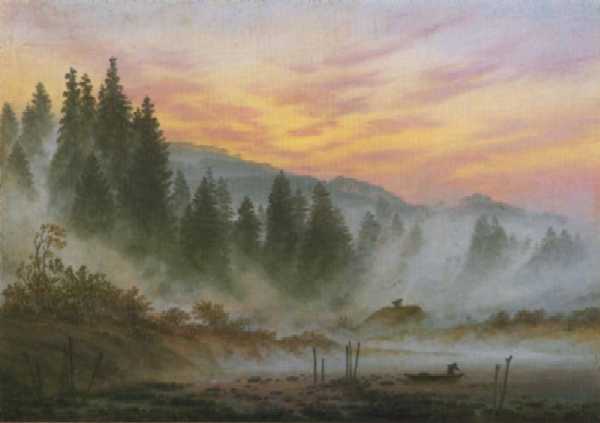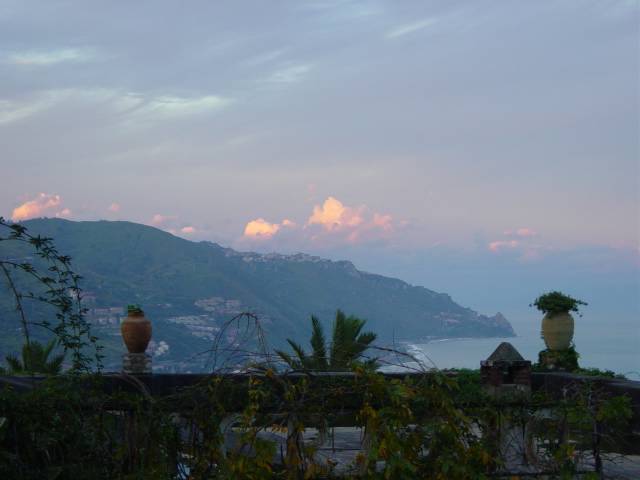

To C18-l
December 2, 1998
Re: A Sicilian Romance: Terrific Energy Caught in Stillness
I have just finished reading this romance and it is superb -- at least I liked it. I realise one could mock it easily: a novel about doors, a novel in which characters hurry along from gallery to gallery, each with its doors which have to be got through; then pass into labyrinthe after labyrinthe only to find themselves in front of yet more doors, which have to be got through; then into the recesses of cavern after cavern, dungeon after dungeon, with yet more doors, only to be confronted by a back stairway (back of what?) which leads out to somewhere underneath a dusky sky and a horizon which extends into infinity. They take another rushed turn through a Salvator Rosa painting only to end up in another dungeon and begin the same dizzying journeys into the recesses of the mind again.
Chapter after chapter places the reader in an endlessly circuitous Piranesi painting, moving deeper and deeper into the dream dungeons where a torture chamber is round the door, and screams are heard in the distance, just.
I was confirmed in my idea that this book did contribute to Austen's S&S and certainly the sequence where Catherine Morland imagines General Tilney has imprisoned his wife for years, feeding her on scraps, is a direct take-off from the story line of Marquis and Marchioness Mazzini at the end of the book. As for Trollope, the early history of Madame de Menon may be an element in Trollope's depiction of the mother in his Lady Anna, and certainly the intense absoluteness of the genre itself reappears; but the area circumscribed by Lady Anna also includes books like Osborne's Look Back in Anger and Braine's Room at the Top. Trollope's is an uncomfortable and at times bitter comment on class conflict.
For Racliffe, I don't see the approach from feminism or any social agenda as relevant; her is a metaphysical and psychosexual art; she writes ghost stories as gothic romances some years before others began the form in earnest. I wonder if there are any people writing who try in ordinary readable English to explain the power of these books? I would be grateful for some recent essays about the poetry of the books.
The power of the book lies in its style, in the charm and gracefulness of the sentences. This is a book by a woman who can write the most rhythmic concise prose which also holds in its still charm the most frightening of experiences: tempests, murders, othing to her. She remains calm.
By-the-bye she uses the word "enthusiastic" positively, takes it out of a Christianized context.
The dialogue is hopeless. Of course the coincidences are hilarious, and don't begin to ask yourself how big Sicily is or try to remember what happened two turns of the plot earlier. If you do, you have not read aright. The idea is to shut off your daylight mind; abandon yourself to the poetry. Austen's Love and Freindship is a wonderful send-up of this aspect of the story. Still ...
I really enjoyed it. I have always thought The Romance of the Forest is in a way Radcliffe at her best. She leans too heavily on her gifts in The Mysteries of Udolpho though individual pieces (e.g., the one often reprinted as "The Haunted Chamber") can still arouse a sense of the uncanny, Freud's un-home-y; The Italian tries to move into characterisation. Perhaps A Sicilian Romance moves a bit too hastily, and has too many sequences instead of developing some of them at more length; on the other hand, it has a terrific energy. Things are just piled on. She lets go. She races on. But details provide the suggestiveness of the irrational and fearful beyond the so-called "norm" of society; The Romance of the ForestL has more of the insidious suggestiveness of a dreadful world of mischief and malice beyond this one -- like those outlined in Jack Sullivan's Elegant Nightmares, a book on how the 19th century ghost story leads into Kafka.
I was confirmed in my idea that this book did contribute to Austen's S&S. There are numbers of close parallels between the two sisters and Marianne and Elinor. Certainly the sequence where Catherine Morland imagines General Tilney has imprisoned his wife for years, feeding her on scraps, is modelled upon the story line of Marquis and Marchioness Mazzini at the end of the book. If Catherine had recently read and really believed this book, no wonder she came to her so-called morbid conclusions. It is Radcliffe who says repeatedly that in Sicily dukes and lords have complete power over everyone on their estates, in their jurisdictions, and there are no public eyes on what's done in private. I don't see the approach from feminism or any social agenda as relevant; her is a metaphysical and psychosexual art; she writes ghost stories as gothic romances some years before others began the form in earnest. I wonder if there are any people writing who try in ordinary readable English to explain the power of these books? I would be grateful for some recent essays about the poetry of the books, and any which connect Radcliffe to Austen.
Ellen Moody

December 3, 1998
To C18-l
Re: A Sicilian Romance: "Early" Radcliffe I thought I would more directly address Rictor Norton's opening comment that "A Sicilian Romance has not often been given its due as a novel of some consequence..."
Speaking from a common sense and practical standpoint, an author's early or first novels are often not given as much attention as they should be. In Gissing's New Grub Street, the successful literary man tells the novelist that one needs to be famous before one writes one's great novels for them to be paid real respect to not only when they come out but later on too, for how a book is first received will influence its later reputation. Radcliffe is also writing in a form that is still scorned. Go to the romance section of a nearby Borders. Enough said.
There is, however, a real criticism one can make of A Sicilian Romance when compared to The Romance of the Forest and The Mysteries of Udolpho. I have heard it said of the latter it's too slow, too long, too much altogether. That is to misunderstand Radcliffe's gift. What makes A Sicilian Romance the lesser book is precisely that it is too fast, moves too swiftly. She moves. But she oughn't to. Too many events are poised within one single sentence; when we have had two tempests, a near murder, a scene wherein a group of men appear to be beating another up viciously as a character hurries through a dungeon to get to the next door, checking to find if he has the key (it is also a novel about keys) in two pages, it's too much. We can barely remember what has occurred, and we are not allowed to dwell. The rhythmic still charm and power of the sentences should not each individually hold that much. When I read A Sicilian Romance I was reminded of an 18th century version of Theagenes and Clariclea which I read a long time ago: the latter also had too much happening all at once, but then that book did not have the indwelling poetic power that Radcliffe has which is dissipated by letting it out in these small spurts (so to speak).
She is a lake in a forest one glances into to watch the effects of the light of the sky on the green and the green back onto the blue woods. I also thought of Pope's famous couplet in Windsor Forest:
"In the clear azure Gleam the Flocks are seen,
And floating Forests paint the Waves with Green"
which is a working up and polished dense version of Ann Finch's couplet in A Nocturnal Reverie:
"When in some River, overhung with Green, The waving Moon and trembling Leaves are seen."
Radcliffe is treating this poetic gift as if it were a faucet which she turns on, lets run on endlessly (as the characters hurry through the Piranesi Dungeons) and then suddenly shuts off without further ado (who could be fooled by that inane and wholly inadequate moral at the end?).
Ellen Moody
To Austen-l
Re: A Sicilian Romance: Its Early Reputation & Austen's S&S and NA
I thought I also suggest why people have argued that the books behind NA are The Mysteries of Udolpho and The Romance of the Forest, not A Sicilian Romance.
First, the books cited in NA are The Romance and Udolpho. A Sicilian Romance is not mentioned. Yet its events are far closer to what we find in both NA and S&S than either of the other two. This perhaps because it's easier to make fun of.
Second, speaking from a common sense and practical standpoint, an author's early or first novels are often not given as much attention as they should be. In Gissing's New Grub Street, the successful literary man tells the novelist that one needs to be famous before one writes one's great novels for them to be paid real respect to not only when they come out but later on too, for how a book is first received will influence its later reputation. Radcliffe is also writing in a form that is still scorned. Go to the romance section of a nearby Borders. Look at the cover of the first printing of the VHS Cassette of Persuasion. Come despicable silly women and listen. Enough said.
There is a real criticism one can make of A Sicilian Romance when compared to The Romance of the Forest and The Mysteries of Udolpho. I have heard it said on this list and elsewhere of the latter they are so long, so slow, no action, and too much description altogether. But what makes A Sicilian Romance the lesser book is precisely what makes it easier to read: it is too fast, moves too swiftly. Radcliffe moves. (Actually she rushes.) But she oughn't to. Too many events are poised within one single sentence; when we have had two tempests, a near murder, a scene wherein a group of men appear to be beating another up viciously as a character hurries through a dungeon to get to the next door, checking to find if he has the key (it is also a novel about keys) in two pages, it's too much. We can barely remember what has occurred, and we are not allowed to dwell. The rhythmic still charm and power of the sentences should not each individually hold that much. When I read A Sicilian Romance I was reminded of an 18th century version of Theagenes and Clariclea which I read a long time ago: the latter also had too much happening all at once, but then that book did not have the indwelling poetic power that Radcliffe has which is dissipated by letting it out in these small spurts (so to speak).
Ann Radcliffe is a lake in a forest one glances into to watch the effects of the light of the sky on the green and the green back onto the blue woods. I also thought of Pope's famous couplet in Windsor Forest:
"In the clear azure Gleam the Flocks are seen,
And floating Forests paint the Waves with Green"
which is a working up and polished dense version of Ann Finch's couplet in A Nocturnal Reverie:
"When in some River, overhung with Green,
The waving Moon and trembling Leaves are seen."
Radcliffe is treating this poetic gift as if it were a faucet which she turns on, lets run on endlessly (as the characters hurry through the Piranesi Dungeons) and then suddenly shuts off without further ado. Who could be fooled by that inane and wholly inadequate moral at the end? Austen wasn't, and she ends her NA on a mock of just such transparent justifications for erotic and violent dreams in alluring and terrifying landscapes.
Ellen Moody
